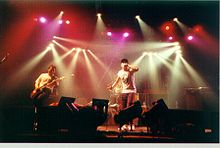Negu Gorriak
| Negu Gorriak | |
|---|---|
 |
|
| Background information | |
| Origin | Gipuzkoa, Basque Country, Spain |
| Genres | Rock, hardcore, hip-hop, ska, reggae |
| Years active | 1990–1996 2001 |
| Associated acts | Kortatu, M-ak, BAP!!, Anestesia, Manu Chao, Nación Reixa, Joxe Ripiau, Sagarroi, 2 Kate, Kuraia, Inoren Ero Ni, Parafünk |
| Past members | Fermin Muguruza, Iñigo Muguruza, Kaki Arkarazo, Mikel Anestesia, Mikel Bap |
Negu Gorriak (Basque for "Red Winters" or "Severe/Harsh Winters") were an underground Basque group. Their musical style combines various styles of rock music such as hardcore punk, hip-hop, ska, and reggae, although it is impossible to separate the band from its political ideology and its identification with the Basque Country and its language (Euskara).
Negu Gorriak was formed in 1990 by the brothers Fermin and Iñigo Muguruza with Kaki Arkarazo (former members of the band Kortatu). Later in 1990, Mikel Anestesia joined them and in 1991, Mikel Bap. This was the complete membership of the group until its dissolution in 1996.
They were completely committed to the political movement, starting with their choice to sing only in Euskera and continuing through their way of work and the message in their songs. They decided to manage themselves and created the record label Esan Ozenki. They performed their first concert in front of Herrera de la Mancha maximum security prison, leading to problems with the government. They were renounced by the Guardia Civil general, Enrique Rodríguez Galindo for the lyrics of the song «Ustelkeria», which accuses the general and the Guardia Civil of being involved in drug trafficking. This was the first time since the end of Franco's regime that the government denounced a form of expression. These charges were dropped in 2001, five years after the group stopped performing together. In honour of their legal victory, the group performed three celebratory concerts to more than 30,000 people.
Negu Gorriak formed at the end of the Basque Radical Rock movement of the 1980s, a genre most similar to punk. Their sound can be identified as a mixture of Basque Radical Rock and American hip-hop. The Basque nationalist movement greatly affected the music and actions of all the members of the group.
Having enjoyed virtually complete political, economic, social and linguistic autonomy throughout its entire existence as a group of people, the Basques were stripped of all of their freedoms when in 1939, Spanish dictator Francisco Franco came into power. Although Franco suppressed basically all Basque culture, it is said that "when General Franco became the dictatorial leader of Spain at the end of the war, he took immediate active steps to eradicate the Basque language. The fledging Basque University (created in 1936) was shut down, books written in Euskara (Basque) were burned, and the language was prohibited in schools, public places, newspapers, and on the radio. All official documents had to be translated into Spanish, and citizens were not allowed to put their Basque names on birth certificates, death certificates or any other legal paperwork." Upon the death of Franco in 1975 and the eventual signing of the Spanish Constitution in 1978, modern day Basques regained virtually all freedoms they once enjoyed before Franco. All of their songs are in Euskera, and two of the group's members went to adult language school (Euskaltegi) in order to be able to communicate in their language. This was a strong message to the Basque Nationalist movement, demonstrating the importance of language with regard to identity. They also incorporated traditional Basque instruments into their music, such as the trikitixa (button accordion).
...
Wikipedia
